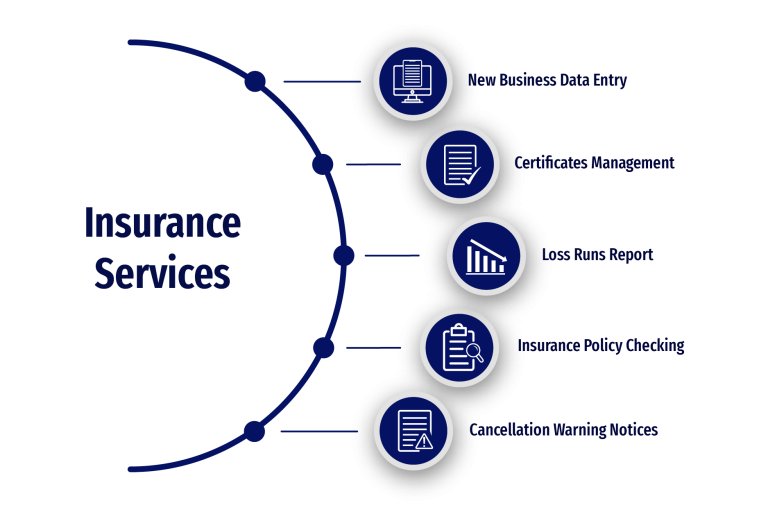Insurance Back Office Outsourcing Services
Boost your efficiency and profitability with our insurance back office outsourcing services, crafted to optimize every aspect of your back office operations. From claims processing and policy administration to underwriting support and compliance management, we provide seamless back office support that empower insurance agencies, brokers, and carriers to focus on growth and customer satisfaction.
Our insurance outsourcing solutions are designed to handle time-consuming tasks such as premium reconciliation, endorsement processing, loss run reporting, and certificate of insurance (COI) management, ensuring accuracy, compliance, and scalability while minimizing turnaround times.

Key Insurance Back Office Services
Our insurance outsourcing solutions help independent agencies, MGAs, brokers, and carriers boost efficiency and reduce administrative burdens.
Quoting and Proposals
We prepare and deliver competitive, tailored insurance quotes and proposals to meet your clients' needs.
Cancellation Warning Notices
Our virtual assistants issue timely cancellation warnings to clients, helping you stay compliant with industry regulations.
First Notice of Loss (FNOL) Processing
We handle initial loss reports promptly, ensuring efficient claims processing from the start.
Loss Runs Report
Our VAs generate detailed loss run reports, offering valuable insights into claim histories and trends.
Policy Renewal Notices
We prepare and send renewal reminders, maintaining seamless policy continuity for your clients.
New Producer Book Conversion
Our specialists seamlessly integrate new producer portfolios into your agency’s system for a smooth transition.
Cost Comparison: In-House vs. Outsourced Insurance Services
| Cost Category | In-House Operations | Outsourced Insurance Services | Savings |
|---|---|---|---|
| Staff Salaries (Administrative) | High salaries and benefits for full-time staff. | Competitive pricing, no overhead costs. | 20-40% savings in staffing costs. |
| Training and Development | Ongoing training for compliance and systems. | Minimal training, experienced staff manage tasks. | 30% savings on training expenses. |
| Office Space and Equipment | Cost of office space, equipment, and utilities. | We provide all equipment within our offices for seamless operations. | 25% savings on office and resources. |
| Employee Benefits | Costly benefits like health insurance and retirement. | No benefits for outsourced staff. | 10-20% savings in benefits. |
| Operational Efficiency | Slower processing, in-house bottlenecks. | Faster, streamlined operations with expert teams. | 30-50% increase in efficiency. |
Common Challenges Insurance Agencies Face
Managing an insurance agency involves complex tasks that often lead to operational inefficiencies. Below are common challenges that our insurance back office solutions address:
High Administrative Workloads
Handling paperwork like policy administration and claims processing in-house can lead to errors and inefficiencies. Outsourcing reduces administrative strain and allows agencies to focus on growth.
Regulatory Compliance & Audits
Staying compliant with NAIC guidelines, state regulations, and data security laws (HIPAA, PCI DSS, GDPR) is crucial. Our insurance services ensure timely compliance, minimizing legal risks.
Inefficient Policy Servicing
Renewals, endorsements, and COI issuance can overwhelm in-house teams, causing delays. Outsourcing policy servicing improves turnaround time and client retention.
Scalability Constraints
As agencies grow, handling increased workloads becomes challenging. Outsourcing provides scalable solutions, reducing bottlenecks and ensuring seamless service without adding in-house staff.
Claim Handling Delays
Accurate and timely claims processing is essential. Outsourcing FNOL, loss run reports, and follow-ups speeds up claims handling, improving customer satisfaction.
Premium Accounting and Reconciliation Issues
Premium payments, invoicing, and commission tracking are complex. Outsourcing ensures accurate financial records and streamlines billing, reducing discrepancies and improving cash flow.
Why Choose Our Insurance Agency Back Office Support?
Cost-Effective Back Office Services
Outsourcing with CLICKVISIONBPO reduces operational expenses by 20-40%, eliminating the need for in-house staff and costly training. Our scalable solutions lower overhead while maintaining high-quality service.
Increased Efficiency and Productivity
Our team streamlines policy servicing, claims processing, and data entry, improving operational efficiency by up to 50%. Agencies benefit from faster turnaround times and fewer administrative bottlenecks.
Financial Stability and Accuracy
By optimizing premium reconciliation and claims processing, our solutions reduce claim processing time by 15-25%. Faster payouts and improved cash flow contribute to better financial stability for agencies.
Dedicated Insurance Experts
Our team is trained in policy checking, claims processing, and underwriting support, offering specialized expertise. With our professionals handling complex tasks, agencies experience improved accuracy and service quality.
Scalable Solutions for Growing Agencies
As MGAs, brokers, and carriers grow, outsourcing offers scalable solutions that reduce bottlenecks and ensure seamless service without adding in-house staff.
Compliance and Risk Management
We ensure full adherence to NAIC guidelines, HIPAA, PCI DSS, SOC 2, ISO 27001, and GDPR, reducing compliance risks. Clients achieve a 100% compliance rate during audits, protecting their agencies from potential liabilities.
Receive Free Operational Consultation
Contact us to explore how our insurance back office outsourcing services can enhance efficiency, reduce costs, and streamline operations.
-
Send a Message
Share your requirements and challenges. -
Expect a Prompt Reply
Receive several solutions tailored to your needs. -
Schedule a Call
Arrange a discussion for further details.
Leadership Team
Dimitar Talevski
Dimitar is a seasoned marketing specialist and the visionary behind CLICKVISION. With over 10 years in digital marketing, he excels in crafting marketing strategies that boost rankings, which in return increase leads, conversions, sales, profits, and ROI.

Filip Dimitrijevski
With a strong background in the marketing industry and healthcare leadership roles, Filip is responsible for CLICKVISIONBPO's sales strategies and onboarding new clients. With a passion for sharing insights gained from his experience, he also shares valuable knowledge through industry related articles.

States We Serve
Complete Insurance Agency Back Office Outsourcing
Help center
Got a question?
Get your answer!
Quick answers to questions you may have. Can't find what you're looking for? Get in touch with us.
Simply contact us to discuss your agency’s needs. We’ll assess your challenges and offer tailored outsourcing solutions that will help streamline your operations and enhance service quality.
Insurance agencies can outsource various tasks, including claims handling, policy administration, premium reconciliation, compliance management, and customer service support.
Our services ensure full compliance with essential regulations such as NAIC guidelines, HIPAA, PCI DSS, and GDPR, helping agencies avoid legal issues and maintain data security.
